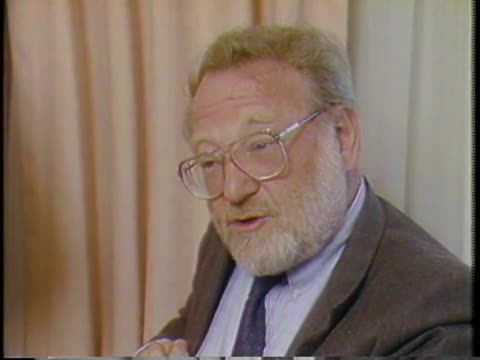Safe Haven
- Program
- Safe Haven
- Producing Organization
- WXII-TV (Television station : Winston-Salem, N.C.)
- Contributing Organization
- The Walter J. Brown Media Archives & Peabody Awards Collection at the University of Georgia (Athens, Georgia)
- AAPB ID
- cpb-aacip-526-8g8ff3n154
If you have more information about this item than what is given here, or if you have concerns about this record, we want to know! Contact us, indicating the AAPB ID (cpb-aacip-526-8g8ff3n154).
- Description
- Program Description
- "SAFE HAVEN tells the story of America's one and only refuges shelter for victims of Hitler's Nazi Europe. One thousand people from 18 countries were brought to the United States in 1944 to live out the war in peace in the small town of Oswego, in upstate New York. The Oswego story is little-known and was mostly overlooked at the time because the refugees arrived shortly after the Normandy invasion. All eyes were on the fighting in Europe. But the story is important for what it tells us about what Americans did -- and did not do -- to help the Jews of Europe during World War Two. "SAFE HAVEN refutes the myth that America 'just didn't know' what was happening to the Jews of Europe in the 1940's. To avoid a scandal that would have portrayed his State Department as Anti-Semitic, President Franklin Roosevelt finally agreed in 1944 to admit 1,000 refugees. This was clearly a token gesture of rescue; 1,000 were admitted in lieu of a larger plan to bring in tens and hundreds of thousands. "The refugees were admitted to the U.S. outside the normal immigration quotas, and they all had to sign a form promising to return to their homeland after the war. They were housed at Fort Ontario, a former army garrison, surrounded by a six-foot-high chain-link fence. They were restricted to the city limits of Oswego and were prohibited from taking jobs outside the internment camps. "For 18 months, the refugees slept, ate, worked and studied at Fort Ontario. They married, had children and died. But they lacked the one thing they wanted most: freedom. The refugees rode an emotional roller coaster as they waited for news of their fate. The feared a return to the 'homelands' that had persecuted and expelled them. "Finally, in December 1945, six months after the war ended in Europe, President Truman allowed the refugees to stay. Most have made tremendous contributions to American society as leaders of business, medicine, and engineering."--1987 Peabody Awards entry form.
- Broadcast Date
- 1987-11-11
- Asset type
- Program
- Media type
- Moving Image
- Duration
- 00:58:24.020
- Credits
-
-
Producing Organization: WXII-TV (Television station : Winston-Salem, N.C.)
- AAPB Contributor Holdings
-
The Walter J. Brown Media Archives & Peabody Awards Collection at the
University of Georgia
Identifier: cpb-aacip-96dd14bf707 (Filename)
Format: U-matic
Duration: 0:58:00
If you have a copy of this asset and would like us to add it to our catalog, please contact us.
- Citations
- Chicago: “Safe Haven,” 1987-11-11, The Walter J. Brown Media Archives & Peabody Awards Collection at the University of Georgia, American Archive of Public Broadcasting (GBH and the Library of Congress), Boston, MA and Washington, DC, accessed February 22, 2026, http://americanarchive.org/catalog/cpb-aacip-526-8g8ff3n154.
- MLA: “Safe Haven.” 1987-11-11. The Walter J. Brown Media Archives & Peabody Awards Collection at the University of Georgia, American Archive of Public Broadcasting (GBH and the Library of Congress), Boston, MA and Washington, DC. Web. February 22, 2026. <http://americanarchive.org/catalog/cpb-aacip-526-8g8ff3n154>.
- APA: Safe Haven. Boston, MA: The Walter J. Brown Media Archives & Peabody Awards Collection at the University of Georgia, American Archive of Public Broadcasting (GBH and the Library of Congress), Boston, MA and Washington, DC. Retrieved from http://americanarchive.org/catalog/cpb-aacip-526-8g8ff3n154
